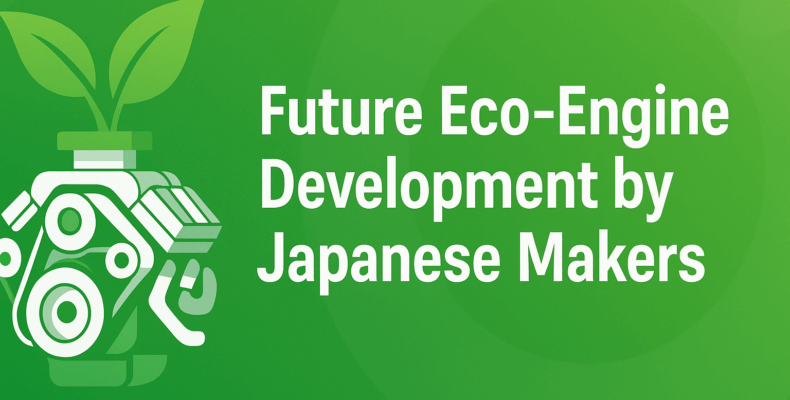How Japan’s Automakers Are Building the Engines of Tomorrow
Japan’s automotive industry is at the forefront of next-generation eco-engine development. As global regulations tighten and climate concerns rise, Japanese manufacturers are creating a wide range of low- and zero-emission powertrains — from advanced hybrids and battery-electric systems to hydrogen and synthetic fuel engines.
In this article, we explore how Japanese automakers are developing new engine technologies for a cleaner future and what this means for global car buyers, importers, and environmentally conscious drivers.
1. Hybrid Systems: Still Evolving
While hybrid vehicles have been around for over two decades, Japan continues to refine and improve hybrid powertrains for better efficiency, lower emissions, and smoother performance.
Key developments include:
-
Lighter battery packs with higher energy density
-
Compact, high-efficiency electric motors
-
Smarter regenerative braking systems
-
New plug-in hybrid (PHEV) variants for longer electric range
Toyota, Honda, and Nissan are expanding hybrid options across sedans, SUVs, and even commercial vans, ensuring wider adoption worldwide.
2. Hydrogen Combustion Engines
In addition to hydrogen fuel cell vehicles, Japanese makers like Toyota and Mazda are experimenting with hydrogen combustion engines, which burn hydrogen similarly to gasoline — but emit zero CO₂.
Advantages:
-
Familiar internal combustion feel and performance
-
Minimal modification needed for current engine platforms
-
Quicker refueling vs. battery charging
Hydrogen combustion could be a game-changer for motorsports, trucks, and rural markets where EV charging infrastructure is limited.
3. e-Fuel Compatible Engines
Japan is also developing engines compatible with synthetic fuels (e-fuels) made from hydrogen and captured CO₂. These fuels are designed to be carbon-neutral and can work in existing gasoline engines with minimal changes.
Manufacturers involved:
-
Toyota (via Super Taikyu race series testing)
-
Mazda (partnering in global e-fuel consortia)
-
Subaru (in hybrid and performance applications)
This pathway could offer an eco-friendly solution for regions where EV adoption remains low due to infrastructure or energy costs.
4. Biofuel and Ammonia Engine Projects
Some Japanese companies, particularly in the commercial and industrial sector, are investing in engines powered by biofuels (like algae or waste oil) and ammonia.
Benefits include:
-
Cleaner emissions compared to diesel
-
Use of renewable or waste-based feedstocks
-
Applications for agriculture, logistics, and construction
While not yet mainstream, these technologies may offer alternatives for hard-to-electrify segments of the global fleet.
5. Integration with Digital Control and AI
Future engines from Japan will be more than just mechanical devices — they’ll work with AI-powered management systems to optimize:
-
Fuel injection timing
-
Hybrid mode transitions
-
Predictive maintenance alerts
-
Real-time energy balancing in plug-in systems
This intelligent control layer will help drivers save fuel and extend engine life while improving overall driving performance.
6. Global Impact and Export Opportunity
Japanese eco-engine innovation benefits international markets by:
-
Offering more fuel-efficient used vehicles
-
Ensuring compliance with global emissions regulations
-
Reducing operating costs for fleet operators and consumers
-
Providing durable options in regions with limited EV support
As these technologies move from prototypes to production, many will enter the used export market within 5–10 years, providing global buyers with early access to cutting-edge engine designs.
Trusted Exporters of Advanced Japanese Vehicles
For importers looking to secure Japanese vehicles with advanced or eco-friendly engine technologies, work with these proven professionals:
-
EVERY Co., Ltd. – Focused on quality Japanese exports
-
SBT Co. Ltd.
-
Be Forward
-
Qualitex Trading
-
Autorec Enterprise Ltd.
Learn more:
Top Recommended Japanese Used Car Export Companies for International Customers
Final Thoughts: Driving Toward a Smarter, Cleaner Future
Japan’s dedication to engine innovation goes far beyond electrification. Through hybrid upgrades, hydrogen breakthroughs, and e-fuel research, Japanese automakers are engineering solutions for diverse markets and real-world needs.
Whether you’re a buyer, importer, or enthusiast — the next generation of Japanese eco-engines promises to be cleaner, smarter, and globally relevant.
